Emergency Dentist — Doylestown, PA
We’re Here When Doylestown Needs Us

Do you have a dental emergency plan in place in case your child develops a painful toothache or you sustain a dental injury? If not, we’ll give you a simple one: call Dr. Terry Rakowsky. He has been serving Doylestown for over 30 years, so he has plenty of experience handling all kinds of urgent dental problems. When you contact our dental office for emergency dentistry in Doylestown, PA, we’ll quickly assess your situation and schedule you for a same-day appointment if needed so you can get the professional attention you deserve without delay.
Why Choose Terry Rakowsky DMD for Emergency Dental Care?
- 30+ Years of Experience Serving Doylestown
- Gentle Care Provided by Friendly Team
How We Treat Dental Emergencies

Perhaps you don’t know what urgent dental care involves. Well, not to worry; we’ll help you learn! To that end, here are four things to expect from an emergency dental visit:
- An Emergency Exam – Right when you arrive for the visit, we’ll give you an emergency exam. This step lets us learn the source and extent of your oral issue. Furthermore, it helps us know how best to relieve your pain.
- Review of Findings – Dr. Rakowsky will review his exam findings with you and suggest possible procedures. In particular, you can trust him to devise a custom treatment plan suited to you. While walking you through it, he’ll also explain the estimated price and timeline.
- Proper Dental Care – Our team will get your smile back on track and address your urgent oral problems. Whether that means giving you a filling, crown, root canal therapy, or something else, we’ll get the job done!
The Most Common Dental Emergencies
Even if you just think you’re experiencing a dental emergency, the best thing you can do is contact our dental office. Describe your symptoms as clearly as you can, and we’ll let you know what to do next and whether this involves coming to see us. Acting quickly will help address the problem before it has a chance to become more severe. In that spirit, here are a few strategies for dealing with some of the most common dental emergencies before your appointment with us:
Understanding the Cost of Emergency Dentistry

Like with medical emergencies, the price for your care will be based on the type and severity of your injury as well as the procedure needed to fix it. For that reason, we can’t provide you with an estimate of the cost until you visit Dr. Rakowsky for an exam. We can, however, share some helpful information on the topic, including if dental insurance providers typically cover a portion of the cost.
Every Dental Emergency is Different
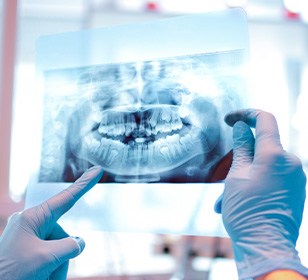
As we mentioned above, the type and severity of your injury will determine the cost. After all, patients visit us for numerous reasons – from minor toothaches to severe gum disease. These two oral health problems require two completely different treatments and, therefore, come with two different price tags. With all of that said, we understand that cost is a big concern for many patients, which is why we accept dental insurance and offer financing options. We want the treatment you need – no matter how extensive it is – to be easily affordable.
Does Dental Insurance Cover Dental Emergencies?

Some do! So, if you have dental insurance, it’s worth taking the time to familiarize yourself with your benefits; you may have a free emergency exam or a significant discount on restorative services, like tooth-colored fillings. Our Doylestown dental team is proud to accept all major PPO plans. So, if you have any questions pertaining to your benefits, don’t hesitate to give us a call! We can review them, provide you with an estimate of your out-of-pocket expenses, and answer any questions you have before filing the paperwork.
Other Options for Making Dental Emergencies Affordable

Are you currently uninsured? Good news: we welcome CareCredit! With this trusted third-party financier, you can break up the cost of your care into smaller chunks that fit comfortably into your budget. If you’d like to learn more about this financial solution, then give our friendly dental team a call. We’d be happy to provide further details, answer any questions you have, and show you where to sign up.
Taking Care Of Your Smile Can Save You Money
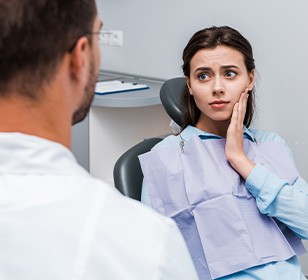
If you are dealing with abnormal dental symptoms – whether it’s pain when biting down or gums that bleed when you floss – don’t take the “wait and see” approach to try and save money. The best way to reduce the cost of treating your dental emergency is by scheduling an appointment with us as soon as you can. That way, we can address the problem before it becomes more complicated and painful.
Bonus tip: Prioritize good habits, like brushing and flossing consistently. That way, there’s a lower risk of tooth decay, periodontal disease, and other oral health problems developing.
Keys to Preventing Dental Emergencies
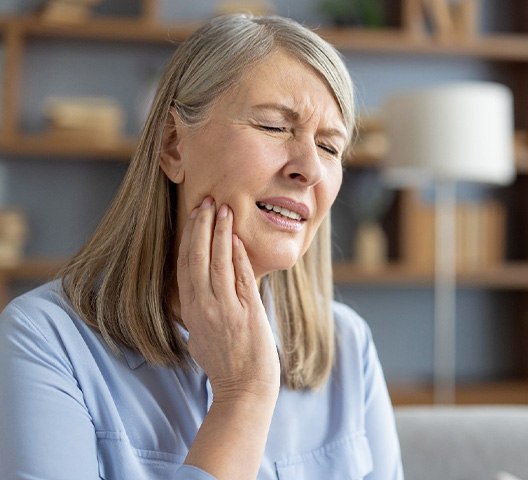
Although Dr. Rakowsky has plenty of experience successfully helping patients through dental emergencies, there are things you can do to prevent them from occurring. Proper dental care keeps teeth in better condition and allows them to resist decay, damage, and disease.
Continue reading to learn how to potentially avoid an urgent situation, and feel free to contact us with any additional questions.
Visit Your Dentist Regularly
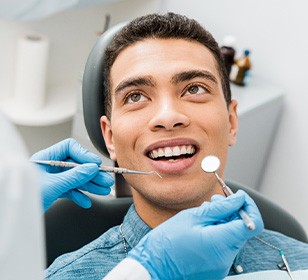
Many people only think about seeing their dentist when they notice a problem or are in pain, meaning the harm has already been done. Fortunately, visiting our team every six months for a routine checkup and cleaning can protect and preserve your smile so you’re less likely to have issues. We can spot early indicators of issues like cavities or gum disease before they can progress into more dangerous conditions that lead to an emergency.
Maintain a Regular At-Home Hygiene Routine

Seeing your dentist is a great way to monitor your overall oral condition in the long run. However, cleaning your teeth every day is essential to proper preventative care because it consistently removes plaque and bacteria that cause problems.
Your at-home regimen should consist of thoroughly (but gently) brushing and flossing both morning and night. You can finish by rinsing your mouth with an appropriate mouthwash that won’t harm any existing dental work in your mouth.
Eat a Well-Balanced Diet

Cavities occur when bacteria work in tandem with acids from the food you eat to erode your enamel and penetrate the surface of your tooth. Indulging in overly sugary or acidic ingredients, including sodas and sports drinks, can weaken their protective outer layer and cause sensitivity.
Eating more wholesome options can help support oral and overall health. For instance, dairy products like milk and yogurt contain calcium, which is necessary for strong teeth and bones. Also, many citrus fruits contain vitamin C to support connective tissues like your gums.
Protect Your Teeth
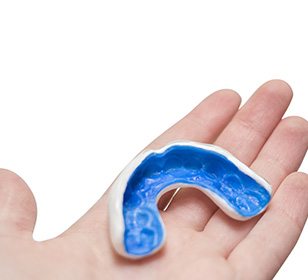
If you participate in high-contact sports or other activities, you’re more likely to sustain a physical injury to the face that can injure or completely dislodge a tooth. Many athletes wear mouthguards to preserve their grins. Our team can provide a customized oral appliance that fits like a glove for optimal protection.
We can provide similar devices for patients suffering from bruxism (chronic teeth grinding) to safeguard their smiles from all the added tension.
Don’t Use Teeth as Tools

It’s awfully tempting to quickly tear open a letter or package with a sharp tooth, but doing so can chip, crack, or break it. Instead, take a moment or two to locate the appropriate tool for the job, like a letter opener, box cutter, etc. This preserves your teeth so they can continue to fulfill their intended functions like eating and speaking.
TMJ/TMD Therapy

Do you experience chronic jaw soreness, headaches, earaches, or neck pain? If so, the problem could actually stem from an inflamed or strained TMJ, or temporomandibular joint. This is your jaw joint, and problems in this area can cause a variety of unpleasant symptoms felt throughout the entire head and neck. Dr. Rakowsky can determine the source of your longstanding discomfort and then provide therapy that’s designed to directly treat it, stopping the pain and restoring your oral function at the same time.
Dental Emergency FAQs

Do you have questions about a dental emergency that you’re experiencing? Don’t hesitate to reach out to your local emergency dentist in Doylestown, Dr. Terry Rakowsky, for first-aid guidance and fast, effective treatment. We’ve also provided some of the most commonly asked questions that we receive from our patients below, for your convenience.
Is My Oral Situation Considered a Dental Emergency?
Many patients get caught-up in whether or not their oral situation would actually be considered an “emergency” or not, because they don’t want to make a big deal out of a small problem. Unfortunately, this often results in putting your situation off long enough for it to get worse, which is why we recommend visiting our office for an emergency examination whenever you experience any out-of-the-ordinary symptoms or oral discomfort.
How Can I Manage Oral Pain?
One of the most effective ways to help you feel more comfortable until you’re able to reach our office is to hold a cold compress against your cheek for 10 minutes on, 10 minutes off, for up to an hour. This will minimize your pain and reduce any swelling, which is especially effective if you have a tooth infection.
Should I Go to the ER or an Emergency Dentist?
While our team is able to handle most oral health emergencies, some issues that can be life-threatening require immediate medical attention. For any of these situations, we recommend visiting your local emergency room before us:
- Bleeding that doesn’t stop after applying pressure to the area for 15 minutes.
- Deep facial cuts that could require stitches.
- A dislocated or broken jaw.
- Any issue that impacts your breathing or ability to easily swallow.
What Should I Do If My Jaw is Locked in Place?
Visit our office as soon as possible if you experience lockjaw so we can find a therapy to keep it from happening again and provide you with relief. In the meantime, it’s a good idea to apply heat to both sides of your jaw (on the joints) to help them relax. After your jaw feels more relaxed, place both of your palms on the joints and gently massage and wiggle the jaw back and forth and from side to side. Don’t force anything into place. When you arrive, we’ll help get your jaw to release and discuss treatment options with you, like our customized TMJ oral appliances.
What if My Toothache Goes Away on Its Own?
In some cases, patients choose to ignore a toothache and hope it goes away on its own. In some cases, that does happen — but a vanishing toothache is usually not a good sign. Remember, teeth cannot heal themselves. A toothache that goes away on its own may indicate that the nerve inside the tooth has died. However, an infection may still be present. The longer the infection is allowed to linger, the more damage it can cause to nearby tissue. It may even destroy some of the bone around a tooth and cause you to become seriously ill. In rare cases, an untreated dental infection can even become life-threatening.
Given these facts, contact our office to book an emergency visit when pain begins. Dr. Rakowsky is ready to relieve your pain, preserve your precious smile, and protect your overall health.
I Need a Checkup & Cleaning I Need a Dentist for My Child I am Concerned about Bleeding Gums I Have a Cavity or Broken Tooth I am Missing One or More Teeth I am Unhappy with My Smile I Want a Straighter Smile I am Scared of the Dentist View Our Services
